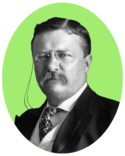| 1916 presidential election | |
  Nominees Roosevelt and Parker | |
| Convention | |
|---|---|
| Date(s) | June 7 – June 10, 1916 |
| City | Chicago, Illinois |
| Venue | Auditorium Building[1] |
| Candidates | |
| Presidential nominee | Theodore Roosevelt of New York (refused nomination) |
| Vice presidential nominee | John M. Parker of Louisiana |
| Other candidates | none |
| Voting | |
| Total delegates | 2000+ |
| Votes needed for nomination | 498 |
| Results (president) | Theodore Roosevelt (NY): 2000+ (100%) |
| Ballots | 1 |
The 1916 Progressive National Convention was held in July 1916, in conjunction with the Republican national convention. This was to facilitate a possible reconciliation. Five delegates from each convention met to negotiate.
The Progressives wanted reunification, but with Roosevelt as the Republican presidential nominee, which the Republicans adamantly opposed. Meanwhile, Charles Evans Hughes, a moderate progressive, became the front-runner at the Republican convention, though opposed by many conservatives. The Progressives suggested Hughes as a compromise candidate. Then Roosevelt sent a message proposing conservative Senator Henry Cabot Lodge. As a result, the Progressives immediately nominated Roosevelt again for president, with Louisiana businessman John M. Parker as the vice presidential nominee. Parker had run for governor as a Progressive early in 1916. (The Republican Party was deeply unpopular in Louisiana.) Parker got a respectable 37% of the vote. He was the only Progressive to run for governor that year.[2] Others suggested for the vice presidency were California Governor and the 1912 vice presidential nominee Hiram Johnson, and Chairman of the Party Convention Raymond Robins, but both withdrew their names in favor of Parker. However, Roosevelt later telegraphed the convention and declared that he could not accept their nomination and would be endorsing Republican presidential nominee Charles Hughes.
- ^ "CHEER ROOSEVELT FOR 93 MINUTES; The Progressive Demonstration Breaks All Duration Records at Mention of His Name. HEARS IT AT OYSTER BAY Telephone Carries Din to Him When He Is Called "Foremost Citizen of the World." KEYNOTE SPEECH STARTS IT Raymond Robins Sets Convention in Prolonged Uproar with His First Sentences". The New York Times. 8 June 1916 – via NYTimes.com.
- ^ CQG, 1985, p. 503
© MMXXIII Rich X Search. We shall prevail. All rights reserved. Rich X Search
